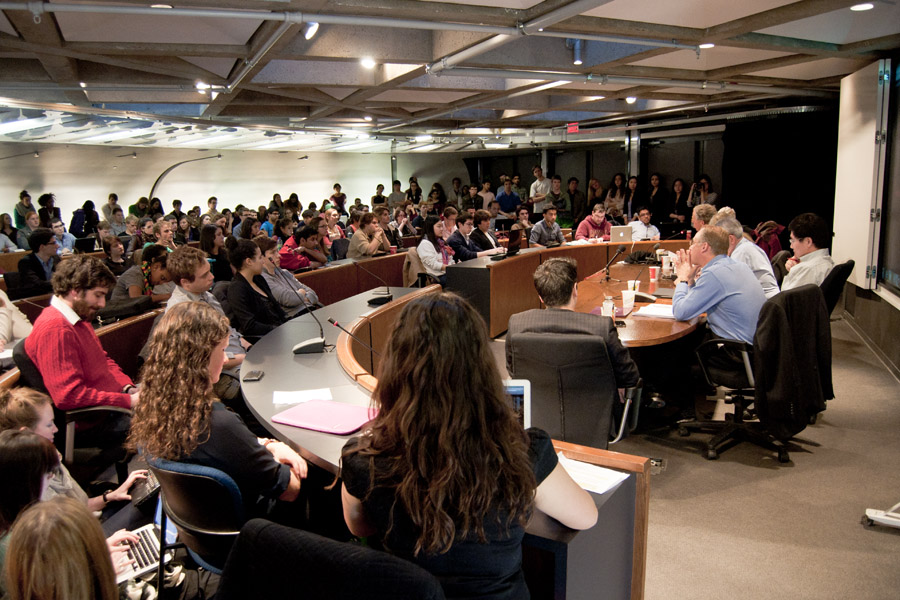On Mar. 26, professors from the Faculty of Management and the departments of economics, environment, and geography met in Leacock 232 to debate the idea of McGill’s divestment from fossil fuels. The event, which was hosted by the Economics Students’ Association (ESA) and Divest McGill, attracted a large number of students; seating was filled to capacity and many attendees were standing.
Following an introduction from Divest McGill, three professors argued in favour of divestment, and three argued against.
Those who were in favour claimed it was immoral of McGill to invest in fossil fuels when global warming and climate change are such relevant problems.
“We misunderstand the concept of liberty in our political economy,” Peter Brown, a geography professor, said. “Once the carbon sinks are filled up, we have to re-examine the idea of liberty very fundamentally, because we can only exercise liberty within our fair share of resources and sinks.”
Holly Dressel, an adjunct professor from McGill’s School of Environment, argued that in divesting from fossil fuels, McGill would be fulfilling its mission to serve its students and the community.
“We are in one of the rare institutions where we have a bit of wiggle room on [financial issues],” Dressel said. “We don’t have to be totally focused on economic details. We are supposed to look at the social, ethical, and service results of what we do with both our money and our institution for students.”
However, the professors who spoke against divestment cautioned that the results of such an initiative are unpredictable.
“Good intentions don’t always produce intended outcomes,” Economics Professor Licun Xue said.
Another main source of concern on the anti-divestment side was the potential cost of divestment for McGill, which is facing the financial stress of government budget cuts. Christopher Ragan, an associate professor of economics, cited several improvements McGill could make with returns from its investments in fossil fuel companies, such as funding new courses, or creating new scholarships.
Jiro Kondo, an assistant professor in the Faculty of Management, argued that divestment would decrease the diversification of McGill’s investment portfolio.

In response, Dressel proposed that the diversification of investments be increased by re-investing fossil fuel funds in Green Revolving Funds, which could be used to improve energy efficiency on campus and to implement other environmentally sustainable initiatives. According to Dressel, this would yield approximately the same return as 28 to 35 per cent of fossil fuel investments.
The six professors also debated about the effectiveness of divestment. Ragan presented data showing that divestment on McGill’s part would not make a sizable impact on the oil industry.
“The proposed divestment by McGill, [and by] 200 like-sized institutions that we might influence, would represent 25 thousandths of the global market capitalization for oil,” he said. “This is worse than an empty gesture in that it costs something, and affects approximately nothing.”
Ragan proposed that instead of divestment, McGill should use the returns from investment to promote better initiatives to solve the economic, technological, and political problems in advertising sustainability that society faces today.
“Rather than giving away [the returns], let’s keep it, and spend it on doing good research,” he said. “McGill is, after all, about producing good ideas … let’s do what we’re good at.”
Dror Etzion, a professor in the Faculty of Management, disagreed with Ragan, declaring that the point of divestment was not to have a direct financial impact on the fossil fuel industry, but rather to set a precedent.
“By divesting, McGill makes itself a force for democracy, sustainability, and a better future, which is what McGill believes in,” Etzion said. “It demonstrates McGill really sees itself as a community, which truly embraces participatory governance, and [is] especially student activated. Divestment presents itself as a learning opportunity …. If we don’t try, we’ll never know.”
Students’ Society of McGill University Sustainability Coordinator David Gray-Donald, who attended the debate, asked the six professors to pinpoint how students could get further involved in the conversation surrounding divestment. Following the event, Gray-Donald said he was disappointed that none of the professors provided a direct response to his question.
At the end of the debate, Dressel commended student members of Divest McGill for starting the push for McGill’s divestment from fossil fuels.
“I would like to congratulate those who created this initiative … because whether [divestment] costs this university money or not, it brings to everyone’s attention that this is an unethical, wrong way to invest in our future,” Dressel said.









